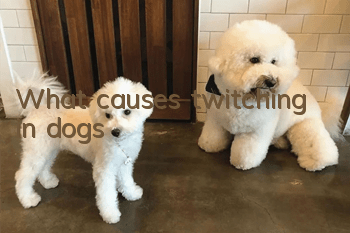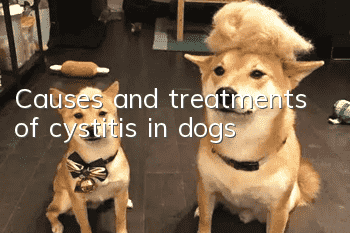What causes twitching in dogs?

Dog convulsions may be caused by calcium deficiency, epilepsy, canine distemper, poisoning, dreams, nervousness and fear, etc. It is recommended that the owner take the dog to the pet hospital for treatment in time. If it is caused by poisoning, the dog needs to be induced to vomit and gastric lavage immediately, and then infused for conditioning. If it is caused by diseases such as epilepsy and canine distemper, oral targeted drugs are needed to control it. If it is caused by calcium deficiency, you need to feed the dog calcium preparations and vitamin D immediately, and often take the dog out to bask in the sun to promote the absorption of calcium. If it is caused by dreaming, nervousness and fear, just calm down the dog.
1. Calcium deficiency
If the dog's usual diet has a single ingredient, which will cause the body to lack calcium, it will cause convulsions. If this is the case, it is recommended to use pet-specific calcium preparations for dogs to supplement the calcium needed by the body, and combine it with an appropriate amount of vitamin D to help the absorption of calcium. In addition, if the dog has just given birth recently, it may be caused by postpartum calcium deficiency. You can feed the dog calcium tablets and observe whether the dog's condition improves.
2. Epilepsy
When a dog suffers from epilepsy, he will suddenly fall to the ground and convulse, usually for 1-2 minutes. Because the dog is unconscious during the convulsions, it is recommended that the owner not move the dog to avoid being bitten. Try to keep the dog in a quiet place. After the dog stops convulsing and regains consciousness, send the dog to the pet hospital for treatment as soon as possible.
3. Canine distemper
When a dog suffers from canine distemper, it may also have symptoms of convulsions in the later stage, and may also be accompanied by runny nose, loss of appetite, and listlessness. , cough and other symptoms. Moreover, this disease is very contagious, so once discovered, the dog needs to be isolated immediately and then sent to a pet hospital for treatment. If treated promptly, there is a high chance of recovery.
4. Poisoning
If the dog suddenly develops convulsions, the possibility of poisoning is relatively high, and it will generally cause symptoms such as foaming at the mouth. For example, if a dog accidentally eats rat poison, pesticides and other toxic substances, it will affect the normal conduction of nerve signals and cause convulsions. In this case, it is recommended to feed the dog an antidote for treatment, and at the same time perform gastric lavage or enema.
5. Dreaming
While sleeping, dogs may twitch uncontrollably if they have nightmares, chase games, weight loss, or are under great mental stress. This situation will not affect the dog's body, and it often happens to dogs.to normal phenomena.
6. Nervous and scared
If a stranger suddenly comes to visit your home, or if there are noises such as firecrackers or decorations around, your dog will feel nervous and scared, and may also suffer from convulsions. Condition. At this time, the owner needs to calm the dog's emotions immediately to avoid causing a stress reaction.
- Will it have any effect if a dog eats cat food?
- Can Teddy be trained at six months? The golden period for Teddy to start training!
- Precautions for dog pregnancy
- How to train a dog to catch a Frisbee? How to train a dog to catch a Frisbee!
- Do dogs need to be shaved if they have skin diseases? How to treat dogs with skin diseases!
- List of foods that dogs cannot eat
- What's the matter with a small pustule on the dog's belly?
- Dog Feeding Guide
- Which dog is the most loyal to its owner? Let your Doberman Pinscher be loyal and protective of his owner!
- How to take care of a Rottweiler dog after giving birth



